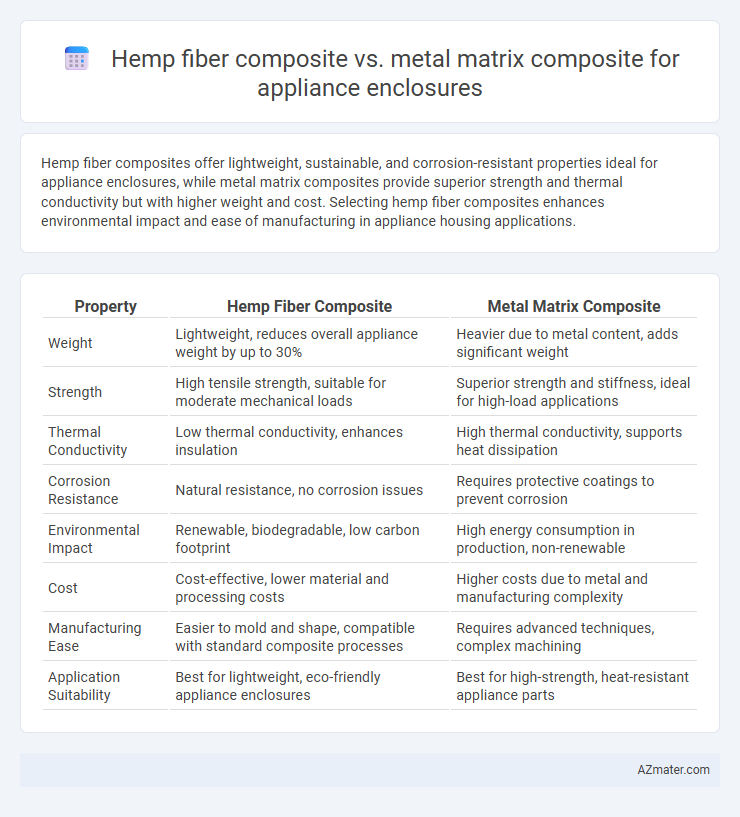Hemp fiber composites offer lightweight, sustainable, and corrosion-resistant properties ideal for appliance enclosures, while metal matrix composites provide superior strength and thermal conductivity but with higher weight and cost. Selecting hemp fiber composites enhances environmental impact and ease of manufacturing in appliance housing applications.
Table of Comparison
| Property | Hemp Fiber Composite | Metal Matrix Composite |
|---|---|---|
| Weight | Lightweight, reduces overall appliance weight by up to 30% | Heavier due to metal content, adds significant weight |
| Strength | High tensile strength, suitable for moderate mechanical loads | Superior strength and stiffness, ideal for high-load applications |
| Thermal Conductivity | Low thermal conductivity, enhances insulation | High thermal conductivity, supports heat dissipation |
| Corrosion Resistance | Natural resistance, no corrosion issues | Requires protective coatings to prevent corrosion |
| Environmental Impact | Renewable, biodegradable, low carbon footprint | High energy consumption in production, non-renewable |
| Cost | Cost-effective, lower material and processing costs | Higher costs due to metal and manufacturing complexity |
| Manufacturing Ease | Easier to mold and shape, compatible with standard composite processes | Requires advanced techniques, complex machining |
| Application Suitability | Best for lightweight, eco-friendly appliance enclosures | Best for high-strength, heat-resistant appliance parts |
Introduction to Appliance Enclosure Materials
Hemp fiber composites offer lightweight, eco-friendly alternatives with high tensile strength and excellent vibration damping, making them suitable for appliance enclosures targeting sustainability. Metal matrix composites provide superior thermal conductivity, wear resistance, and mechanical strength, ideal for enclosures requiring enhanced durability and heat dissipation. Selecting between these materials depends on desired properties such as environmental impact, mechanical performance, and thermal management in appliance enclosure design.
Overview of Hemp Fiber Composites
Hemp fiber composites offer lightweight, sustainable alternatives to traditional metal matrix composites for appliance enclosures, boasting high strength-to-weight ratios and excellent impact resistance. These composites utilize natural hemp fibers embedded in polymer matrices, providing superior vibration damping and corrosion resistance compared to metals such as aluminum or steel. The renewable nature of hemp fibers supports eco-friendly manufacturing processes, reducing carbon footprints while maintaining structural integrity in appliance housing applications.
Overview of Metal Matrix Composites
Metal Matrix Composites (MMCs) consist of a metal alloy matrix reinforced with materials such as ceramics or fibers, offering superior strength, thermal conductivity, and wear resistance compared to traditional metals. MMCs provide enhanced mechanical properties and dimensional stability, making them ideal for appliance enclosures requiring durability and heat dissipation. Their higher cost and weight relative to Hemp Fiber Composites make them more suitable for high-performance applications where enhanced structural integrity and thermal management are critical.
Mechanical Strength Comparison
Hemp fiber composites exhibit lower tensile strength and impact resistance compared to metal matrix composites, which offer superior mechanical durability for appliance enclosures under heavy load conditions. The specific tensile strength of hemp fiber composites typically ranges between 200-400 MPa, while aluminum-based metal matrix composites reach values exceeding 500 MPa, making them more suitable for structural support. Despite this, hemp composites provide adequate rigidity and improved vibration damping, beneficial for lightweight appliance designs.
Weight and Density Differences
Hemp fiber composites exhibit significantly lower density, typically around 1.2 g/cm3, compared to metal matrix composites that range between 2.5 to 4.5 g/cm3, leading to substantial weight reduction in appliance enclosures. The lightweight nature of hemp fiber composites enhances energy efficiency and ease of handling during manufacturing and assembly. Metal matrix composites offer higher strength and thermal conductivity but result in heavier enclosures, impacting portability and increased material costs.
Thermal Conductivity and Heat Resistance
Hemp fiber composites offer lower thermal conductivity compared to metal matrix composites, providing better insulation properties essential for appliance enclosures that require temperature control. The heat resistance of metal matrix composites typically surpasses hemp fiber composites, enabling them to withstand higher operating temperatures without degradation. However, hemp fiber composites deliver superior thermal insulation while maintaining structural integrity, making them suitable for applications where energy efficiency and lightweight design are priorities.
Environmental Impact and Sustainability
Hemp fiber composites offer significant environmental benefits over metal matrix composites due to their renewable, biodegradable nature and lower carbon footprint during production. The energy-intensive extraction and processing of metals result in higher greenhouse gas emissions compared to the cultivation and processing of hemp fibers combined with bio-based resins. Hemp composites also contribute to waste reduction through recyclability and compostability, making them a more sustainable choice for appliance enclosures focused on eco-friendly manufacturing and end-of-life disposal.
Cost Analysis and Economic Viability
Hemp fiber composites offer a cost-effective alternative to metal matrix composites for appliance enclosures due to lower raw material costs and reduced energy consumption during manufacturing. The lightweight nature of hemp fiber composites also leads to savings in transportation and assembly, enhancing overall economic viability. While metal matrix composites provide superior strength and thermal conductivity, their higher production expenses make hemp fiber composites more attractive for budget-conscious applications with moderate performance requirements.
Durability and Long-Term Performance
Hemp fiber composites offer high impact resistance and excellent fatigue strength, making them suitable for appliance enclosures requiring lightweight durability and environmental sustainability. Metal matrix composites provide superior thermal stability, wear resistance, and structural rigidity, which enhances long-term performance under high stress and temperature variations. Comparing both, hemp fiber composites excel in corrosion resistance and reduced weight, while metal matrix composites outperform in mechanical strength and heat dissipation for demanding appliance applications.
Future Trends in Appliance Enclosure Materials
Hemp fiber composites offer lightweight, sustainable alternatives with excellent vibration damping and thermal insulation properties, increasingly favored in eco-conscious appliance design. Metal matrix composites provide superior strength, thermal conductivity, and durability, making them ideal for high-performance or heat-intensive appliance enclosures. Future trends indicate a hybrid approach combining hemp fiber composites for sustainability and metal matrix composites for structural integrity, driven by advancements in material science and regulatory pressure for greener manufacturing.

Infographic: Hemp fiber composite vs Metal matrix composite for Appliance enclosure
 azmater.com
azmater.com